What does your sex have to do with it? How to keep your heart ticking.
Join us for a FREE presentation, lunch, and discussion with heart expert Dr. Neil Sanghvi. The event will be held Wednesday, July 29 from Noon to 1pm at the WJCT Studios.
You will benefit from attending this event if you are interested in learning about the facts, symptoms, and treatments of irregular heart rhythms as well as understand the differences between women and men when it comes to heart care.
Surprising but true: Heart failure is more common in women than men, yet women receive treatment 2X less often than men. The focus of this community heart education talk is to discuss available therapies to treat irregular heartbeats and how women are treated differently than men.
Learn more about:
- How to decide if a cardiac device is right for uou and life after implant.
- The role of catheter ablation for the treatment of atrial fibrillation (Afib).
- Men are Mars and Women are from Venus. Does it matter?
Dr. Neil Sanghvi
Dr. Sanghvi is recognized as a leader in the field of clinical electrophysiology. His interests include atrial fibrillation, novel techniques for stroke prevention, and device therapy for heart failure and irregular rhythms.
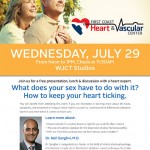
State of the Art Cath Lab now open
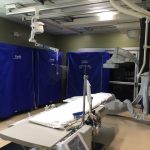 First Coast Heart and Vascular Center now has it’s own state of the art Cath Lab. First Coast Heart and Vascular Center is one of the few cardiology groups in North Florida to routinely offer transradial cardiac catheterization procedures, and our physicians have been perfecting this procedure for over 13 years. Our physicians are involved with training new physicians and already accredited interventional cardiologists in this technique.
First Coast Heart and Vascular Center now has it’s own state of the art Cath Lab. First Coast Heart and Vascular Center is one of the few cardiology groups in North Florida to routinely offer transradial cardiac catheterization procedures, and our physicians have been perfecting this procedure for over 13 years. Our physicians are involved with training new physicians and already accredited interventional cardiologists in this technique.
First Coast Heart and Vascular Center opened its office based or outpatient cardiac & vascular cath lab on January 14, 2015. It is a state of the art Cath Lab facility and first system of its kind in the USA. We are honored to have been able to team with Schimadzu to get the latest version of cutting edge equipment that has the most advanced software and imaging system which makes the operator’s job easier, safer and that significantly reduces procedure time, radiation to both patient and operator and the amount of contrast used. the advancement in technology in this system is second to none.
The First Coast Heart and Vascular Center Cath Lab offers not only heart catheterization but also we are able to perform simple angiogram and intervention to most complex peripheral vascular procedures. Such procedures include: Carotid angiogram, renal angiogram, mesenteric angiograms, leg angiogram, abdominal aneurysm angiogram and the same for interventions. We use the latest in interventional technology from simple balloon angioplasty, simple stents to medicated stents, multitude of atherectomy devices including laser. We diagnose and treat all vascular beds from the neck to the feet (arterial or venous).
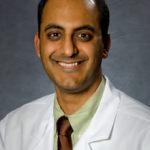
We are pleased to announce that Dr. Neil Sanghvi has joined First Coast Heart & Vascular Center. Dr. Sanghvi has been recognized as a leader in the field of clinical electrophysiology and is honored to carry the distinction of being a Fellow of the Heart Rhythm Society as well as a Fellow of the American College of Cardiology. His current interests include improving techniques in atrial fibrillation ablation, minimally invasive closure of the left atrial appendage for stroke prevention, and management of congestive heart failure with biventricular devices. Dr. Sanghvi actively participates in national clinical research trials and has authored several papers on the topic of arrhythmia management.
“I believe that each patient deserves attention, compassion, respect, and the opportunity to understand their particular ailment. I strive to provide personalized care and take pride in being able to clearly communicate with my patients. My reward is seeing a patient
successfully and safely complete a procedure and witness the often immediate improvement in their quality of life.”
Dr. Sanghvi began his interested with medicine early in high-school. He was accepted and attended the prestigious 7-year medical program at Boston University. From there, he returned to his home state of New Jersey where he completed medical school at Rutgers- New Jersey Medical School. Dr. Sanghvi found that he missed Boston, so he returned to Boston University for his Internal Medicine Residency. He then travelled to Washington,D.C. to participate in the George Washington University Cardiology Fellowship Program. He completed his Electrophysiology training at the prestigious Weill Cornell Medical Center in New York City. Dr. Sanghvi practiced for 5 -years in New York City before arriving to Florida. He was instrumental in expanding the complex ablation program at Lenox Hill Hospital in Manhattan.
Common disorders that Dr. Sanghvi manages include atrial fibrillation, SVT,ventricular tachycardia, syncope (passing out), palpitations, pacemakers, and ICDs (defibrillators).
We are happy to have Dr. Sanghvi on our team
Is This Just an Irregular Heart Beat or Can I Have a Stroke?
Is there a Cure? Maybe, with Ablation.
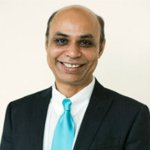
Printable Version of Atrial Fibrillation Article
Atrial Fibrillation – also known as AFib or AF – is the most common arrhythmia. It affects more than 2.5 million American adults and 4.5 million people living in the European Union, and accounts for approximately one-third of hospitalizations for cardiac rhythm disturbances.
It is characterized by rapid and irregular heartbeat caused when the top chambers of the heart (the atria) quiver (fibrillate) erratically, sometimes faster than 20o times per minute.
AFib can also increase the risk of stroke fivefold. It is estimated to be responsible for 88,000 deaths and $16 Billion in additional costs to the U.S. Healthcare system. As the world population ages, the prevalence of AFib is projected to increase. In fact, in the next 30-40 years, the number of people diagnosed with AFib in the U.S. is expected to more than double.
Here’s how patients have described their experience:
“My heart flip-flops, skips beats, and feels like its banging against my chest wall, especially if I’m carrying stuff up my stairs or bending down.”
What happens during AF?
Atrial Fibrillation (AF) is the most common type of irregular heartbeat. Normally, you heart contracts and relaxes to a regular beat. In atrial fibrillation, the upper chambers of the heart (the atria) beat irregularly (quiver) instead of beating effectively to move blood into the ventricles. About 15-20 percent of people who have strokes have arrhythmia.
Additional common symptoms of atrial fibrillation
Sometimes people with AF have no symptoms and their condition is only detectable upon physical examination. Still, others may experience one or more of the following symptoms:
- Rapid and irregular heartbeat
- Fluttering or “thumping” in the chest
- Dizziness
- Shortness of breath and anxiety
- Weakness
- Faintness or confusion
- Fatigue when exercising
- Sweating
- *Chest pain or pressure
*Chest pain or pressure is a medical emergency. You may be having a heart attack. Call 9-1-1 immediately.
Are there different types of AF? Do they have different symptoms?
The symptoms are generally the same; however the duration of the AF and underlying reasons for the condition help medical practitioners classify the types of AF problems.
- Paroxysmal fibrillation is when the heart returns to a normal rhythm on its own. People who have this type of AF may have episodes only a few times a year or their symptoms may occur every day. These symptoms are very unpredictable and often can turn into a permanent form of atrial fibrillation
- Persistent AF is defined as an irregular rhythm that lasts for longer than 7 days. This type of AF will not return to normal sinus rhythm on its own and will require some form of treatment.
- Permanent AF occurs when the condition lasts indefinitely and can no longer be controlled with medication.
Over a period of time, paroxysmal fibrillation may become more frequent and longer lasting, sometimes leading to permanent or chronic AF. All types of AF can increase your risk of stroke. Even if you have no symptoms at all, you are nearly 5 times more likely to have a stroke than someone that does not have atrial fibrillation.
Know your treatment goals
The treatment goals of atrial fibrillation (AF) start with a proper diagnosis through an in-depth examination from a physician. The exam usually includes questions about your history and often an EKG or ECG. Some patients may need a thorough electrophysiology study.
Prevention and Risk Reduction
After a patient is diagnosed with atrial fibrillation, the ideal goals may include:
- Restoring the heart to a normal rhythm
- Reducing an overly high heart rate
- Preventing blood clots
- Managing risk factors for stroke
- Preventing additional heart rhythm problems
- Preventing heart failure
1. How will I prevent stroke?
Depending on your risk, you will likely either need aspirin or warfarin or another type of anticoagulation medication.
2.Are there additional lifestyle modifications important for stroke prevention?
3.What is my C.H.A.D.S. risk? Congestive heart failure Hypertension Age (75 or greater) Diabetes Stroke (prior episode)
4. Are there options to control my heart rate and this irregular heart rhythm?
Based on your past medical history and risk for having a future stroke, there are several options for you and your health care provider to discuss in order to manage your AF.
Medications for Atrial Fibrillation (AF)
Medications are often prescribed to prevent and treat blood clot which can lead to a stroke. The longer you have untreated AF, the less likely it is that normal rhythm can be reestablished.
Medication options may include blood thinners, rate controllers, and rhythm controllers. Lists included here are not intended to be comprehensive, and we encourage you to contact our office to keep up with the newest in AF medication options.
Preventing Clots with Medication (antiplatelets and anticoagulants)
Drugs such as blood thinners are given to patients to prevent blood clot formation or to treat an existing blood clot. Examples include Aspirin, Warfarin and other FDA Approved anticoagulants.
Important Precautions when taking anti-clotting medications
- Call your healthcare provider right away if you have any unusual bleeding or bruising
- If you forget to take your daily anticoagulant dose, Don’t take an extra one to catch up! Follow your healthcare provider’s directions about what to do if you miss a dose.
- Always tell your doctor, dentist and pharmacist that you take one of these medicines.
- Many drugs change the effects of these agents on the body. Even vitamins (and some foods) could change this effect.
Heart Rate Controlling Medication
Beta blockers, Calcium blockers and Digoxin are drugs used to slow the heart rate. Most people can function and feel better if their heart rate is controlled. Some examples may include Carvedilol, Metoprolol, Atenolol, Dilitazem, and Verapamil.
Heart Rhythm Controlling Medications
Once your heart rate is under control, the next management consideration is usually treating the abnormal heart rhythm with medications to restore the heart rhythm to normal. Your healthcare provider will most likely want to monitor progress closely. Examples include Flecainide (Tambocor), Propafenone (Rhythmol), Amiodarone, Carodarone or Pacerone, Sotalol (Betapace), or Dronedarone (Multaq).
The decision to use electrical cardio version
Your provider may recommend a trans esophageal Echocardiogram (TEE) as a first step. The TEE procedure involves swallowing a small ultrasound device that allows the healthcare team to look inside your heart atria for blood clots.
Radiofrequency Ablation or Catheter Ablation
Catheter ablationis an atrial fibrillation treatment that is done by a specialized cardiologist, called an Electro physiologist (EP) who deals with irregular heartbeats (arrhythmias).
It is a minimally-invasive procedure that is generally less invasive than surgery. It is a commonly-used treatment for atrial fibrillation as well as other cardiac arrhythmia. Like other atrial fibrillation treatments, it is most successful in treating paroxysmal atrial fibrillation, but much progress has been made in treating persistent and long standing persistent as well.
Ablation is used for cardiac arrhythmias when long-term medications or electrical cardio version are either not preferred or were not effective. Or when the patient prefers no to take any medications. Before ablation surgery, electrical mapping of the heart is performed. An electrically sensitive catheter is used to map the heart muscle and the origins of the “extra” electrical activity throughout the heart. The map tells the physician which areas of the heart are creating problematic electric signals that interfere with the proper rhythm. After a single procedure, more than 60-70% of patients with an otherwise normal heart can enjoy freedom from arrhythmias according to studies that have followed patients typically for one year. With two or more procedures, the efficacy can be as high as 80-90% in other recent case studies.
Catheter ablation is the only cardiac procedure that can be correctly called curative (No, stents are not curative)
How is an ablation performed?
A catheter (thin, flexible tube) is inserted into the patient’s blood vessels and is gently guided to the heart. The physician carefully destroys malfunctioning tissue using the catheter to deliver energy (such as radiofrequency, laser or cryotherapy) to scar the problematic areas. The scarred areas will no longer send abnormal signals. If successful, the heart will return to a normal rhythm. This minimally invasive procedure usually has a short recovery period. Patients are generally placed on a short course of anti-arrhythmic drugs while the procedure takes full effect.
Common types of Ablation include:
- Pulmonary vein isolation ablation (PVI ablation or PVA) In some AF patients, fibrillation is triggered by extra electrical currents in the pulmonary veins. During this procedure, the catheter tip is used to destroy the tissue that is sending the extra currents and, in most cases, normal heart rhythm returns.
- AV node ablation with pacemakers. In other AF patients, the trigger for their AF occurs in the AV node (the place where the electrical signals pass from the atria to the ventricles). The catheter is placed near the AV nod and a small area of tissue is destroyed. A pacemaker is then implanted to restore and maintain the heart’s normal rhythm.
At First Coast Heart & Vascular Center, our group treats atrial fibrillation conservatively with medical treatment, however for select cases our board certified electrophysiologist, Dr. Dinesh Pubbi can perform Atrial Fibrillation ablations at the hospitals that have state of the art EP labs.
Dear Patients & Friends,
First Coast Heart & Vascular Center welcomes you to our Jacksonville Cardiology practice.
Dr. Vincent. Caracciolo, Dr. L. Van Crisco, Dr. David Grech, Dr. Kevin Hayes, Dr. Dinesh Pubbi, and Dr. Neil Sanghvi and their team of professionals would like to extend warm and sincere thanks for choosing our cardiology practice for your heart and vascular needs.
First Coast Heart & Vascular Center has made a sincere commitment to excellence that is second to none. We stand by core principles of: Quality, Integrity and Compassion. We will always put our patients first.
In our four main offices covering four counties (Duval, Clay, St. Johns and Flagler), First Coast Heart & Vascular Center provides a wide range of cardiac, vascular & electrophysiological diagnostic testing. We also have satellite offices in Duval County that are conveniently located to serve our patients.
Our physicians service all major hospitals in the Duval, Clay and St. Johns counties including:
- Memorial Hospital Jacksonville,
- Baptist Hospitals (downtown and South),
- St. Vincent Hospital South,
- Orange Park Hospital,
- Flagler Hospital in St. Augustine,
- Specialty Hospital
- Brooks Hospital.
We are on call 24/7 for our patients. If you are admitted to any of these hospitals, we will be happy to attend to your needs as long as you make it known and request that our doctors see you. We have access to your records from any of our offices or homes and that will ensure that there are no interruptions in your care. It will also cut down on your expenses, health care system expenses and will eliminate duplication and unnecessary testing.
Our main offices are equipped with the latest in Nuclear imaging machines, Echo or Vascular equipment as well as the latest in Electronic Medical Records (EMR) which facilitate getting all your records to your primary care or referring doctors in an expeditious manner and with high efficiency. EMR assures a full circle of care with your referring doctors and hospitals. Our board certified cardiologists offer a spectrum of services including, but not limited to: consultation, diagnostic stress testing (Nuclear), Echocardiography, vascular testing, pacemaker or defibrillator implantation & interrogation, diagnostic cardiac & vascular catheterization (Angiography) and intervention (Stents, Rotablators, Laser, Debulking with Atherectomy, Carotid Artery or Renal Artery Stenting, PFO Closure, etc.).
Dr. Dinesh Pubbi is a board certified electrophysiologist with much successful experience in atrial fibrillation treatment including Atrial Fibrillation Ablation.
Dr. L. Van Crisco welcomes both cardiac and vascular patients and especially complicated vascular patients with special attention to vein disease. He is a nationally recognized interventional cardiologist with a vast experience in both cardiac and vascular intervention as well as structural heart disease.
First Coast Heart and Vascular Center contracts with every major insurance company as well as Medicare, Tricare and Medicaid. We offer a wide range of financial plans for your piece of mind. We will work with you to make your care affordable. Please browse the patient portal where you may access us 24 hours a day or send a scheduling question, billing question, or a comment or suggestion. You will be contacted within ONE business day by knowledgeable professional staff ready to help you.
Our doctors welcome new patients, former patients and patients seeking a second opinion in all of our offices. Our doctors cross cover each other when one is caught up in an emergency or on vacation to make sure your care is not interrupted.
Please help us keep you informed of your care by pointing out which of our doctors you wish to see and which office location you prefer to visit.
We at First Coast Heart & Vascular Center also want you to know that we support our Veterans and our Local Law Enforcement communities; they are here for all of us so we will be here for them.
Thank you for choosing First Coast Heart & Vascular Center, PA and for putting your heart in our hands.
Respectfully,
The doctors and staff at First Coast Heart & Vascular Center
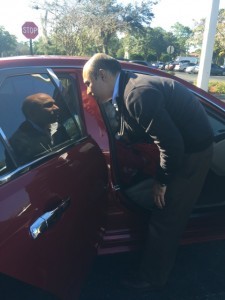


 First Coast Heart and Vascular Center now has it’s own state of the art Cath Lab. First Coast Heart and Vascular Center is one of the few cardiology groups in North Florida to routinely offer transradial cardiac catheterization procedures, and our physicians have been perfecting this procedure for over 13 years.
First Coast Heart and Vascular Center now has it’s own state of the art Cath Lab. First Coast Heart and Vascular Center is one of the few cardiology groups in North Florida to routinely offer transradial cardiac catheterization procedures, and our physicians have been perfecting this procedure for over 13 years. 
